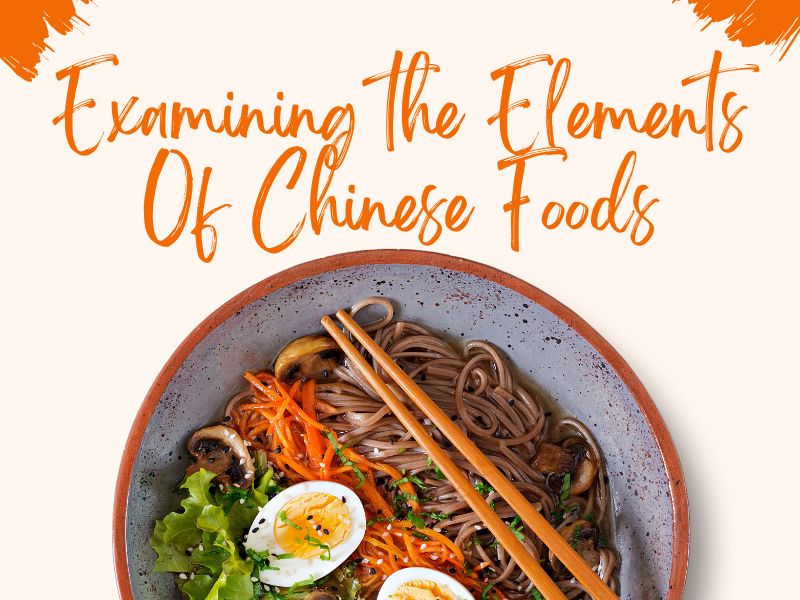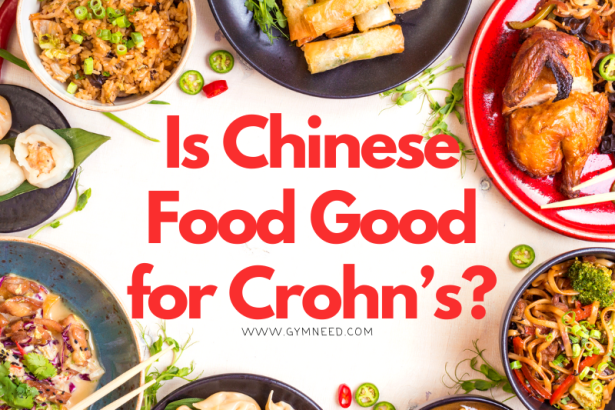Crohn’s disease is a lifelong, inflammatory bowel disease that affects the gastrointestinal tract. It is important to moderate the intake of food because food could become a pivotal ally in alleviating symptoms, avoiding relapses, and ensuring permanent health of the gut. Chinese food is probably most questioned when a patient diagnosed with Crohn’s is trying to figure out his/her diet. With its rich variety of sauces, stir fries, and piquant dishes, would Chinese cuisine be appropriate for Crohn’s upper gastrointestinal disease?
This article explains some links between Chinese food and Crohn’s disease along with some suggestions on which Chinese food could be beneficial and which should be avoided.
Crohn’s Disease and Diet in a nutshell
However, before we look at Chinese food specifically, let’s first consider the relationship between Crohn’s disease and diet together. The disease can be associated with symptoms such as diarrhea, belly pain, and fatigue. There is no one standard diet for Crohn’s, but some food choices can irritate the symptoms, while some could be beneficial for them.
Moderate carbohydrates and a special restriction on intake of sugars are notes to active Crohn’s. The intake of such foods will ease some stress from the digestive tract. On the opposite end, the consumption of hot, oily and very fibrous foods could irritate the bowel and bring about inflammation.
Examining the Elements Of Chinese Foods While Living with Crohn’s

Rice and Noodles: Is it The Right Choice for People with Crohn’s?
Rice and noodles are microbial staples in most of the Chinese cuisines and they can be safe options for Crohn’s patients. White rice is especially appropriate during Crohn’s farragoms because it is starchy, easy to digest and low in insoluble fibers. Undoubtedly rice noodles provide digestible caloric sugar when boiled and mildly flavored.
But be careful when ordering fried rice or noodle dishes. Such dishes contain more oil and fat which could irritate the gastroenteric organs. Choose steamed rice and rice noodles instead of fried ones if possible.
Proteins: Meat, Fish and Tofu for a Crohn’s Diet.
Protein is another basic nutrient of any diet and is abundant in Chinese foods. Most patients with Crohn’s disease can consume poultry meat, fish , and other sources of protein without much anxiety. Nutrition can be obtained from steamed and pan fried chicken or fish which are cooked with very small amounts of oil.
Tofu, often found in Chinese food, is made from vegetables and can be easier to digest than meat protein for some people. It is mild, low in fat, and high in protein, which can benefit people suffering from Crohn’s disease.
Avoid dishes containing pork, duck, or beef, even if they are stewed or grilled as they may be difficult to digest and may create some unpleasant conditions.
Vegetables: Helpful or Dangerous in case of Crohn’s?
Vegetables are essential in any diet, but high-fiber vegetables may need to be avoided by people with Crohn’s disease especially during periods of inflammation. Chinese food does however call for a lot of vegetables including the likes of broccoli, bok choy, carrots, and bell peppers. Raw or insufficiently cooked vegetables can worsen the symptoms of Crohn’s disease.
It is more appropriate to select cooked vegetables as steaming or stir frying makes them easily digestible. Zucchini, carrots, and mushrooms are soft vegetables that are recommended as they do not irritate the gastrointestinal tract too much. Spinach and bok choy are dark green leafy vegetables that can cause gas and pain if taken in raw form.
Sauces and Seasonings: Handle with Care
Chinese food is popular partly because of its array of sauces and seasonings. Nonetheless, Crohn’s patients need to be vigilant as many of the traditional Chinese sauces including the common soy, oyster and hoisin varieties, can be on the salty side leading to dehydration which is a risk for Crohn’s patients. In addition, hot Szechuan sauce or chili oil may also be well contraindicated as they can also aggravate the lining of the gut, leading to flare-ups.
When ordering Chinese, one should ideally make it a point to ask for sauce or seasoning on the side. It is also better to suggest that the food be prepared with minimum seasoning. Many Crohn’s patients may also benefit from using low sodium soy sauces or light broth based sauces that do not contain a lot of salt.
Monosodium glutamate and other artificial preservatives
Another frequent ingredient in the Chinese diet that has for a long time been at the center of attention is mono-sodium glutamate (MSG). First of all, it’s safe to say that MSG and Crohn’s are not friends, but it’s also worth mentioning that it isn’t entirely dangerous either. Some individuals with Crohn’s may tend to develop an intolerance to MSG and consequently, begin to suffer from digestive issues. It is also worthwhile to mention going to Chinese takeaways or cooking Chinese food at home without using MSG or any preservatives as they can irritate the digestive tract.
Fats and Oils: The Effect on the Digestive System
Chinese cuisine greatly varies in the content of fat depending on certain cooking methods. Therefore, certain dishes, especially those composed of egg rolls, fried wontons, or crispy beef which are cooked by deep frying, should be avoided due to the high content of fat which poses problems to people suffering from Crohn’s disease. Food like this is hard to chew and even more non-gentle digestion might lead to diarrhea with cramping.
In this regard, they should choose dishes that hop through healthier forms of cooking such as steamed, boiled or where sesame oil is only used sparingly while stir-frying. For instance, steamed dumplings are less appetizing than spring rolls but they are safer.
Which Chinese Dishes Can Be Eaten by People Suffering From Crohn’s?
certain Chinese dishes can be quite nourishing and safe for individuals with Crohn’s so long as the person involved exercises caution while consuming them:
- Steamed Chicken and Vegetables: This meal does not contain heavy sauce or oil, and further has soft, boiled vegetables and lean protein which are easy on the stomach.
- Chicken Congee: Rice porridge in Chinese style, which is congee is considered to be soothing and is soft enough for the stomach. It is good when the disease is aggravated and substantial food is problematic.
- Steamed Dumplings: For some reason, don’t pick fried ones, use low filling steamed dumplings when they are available.
- Egg Drop Soup: This light and only mildly appetizing, broth based soup makes sure that nutrients are provided without adding much fats or fiber in the mix. It is considered the best starter dish even for the most sensitive stomach.
- Tofu Stir-Fry( Lightly Stir-Fried): If tofu is cooked using little to no oil and comes along with vegetables that are well done on the stove then yes, Tofu can be a safe and healthy meal for Crohn’s patients.
Chinese Foods to Avoid with Crohn’s
Though there are some foods that are safe in moderation, there are other types of foods, usually Chinese food, that people suffering from Crohn’s Disease should always try to avoid.
- Fried Foods: Such as spring rolls, fried rice or sweet-and-sour pork are also fats and oils containing items and should be avoided since they worsen Crohn’s symptoms.
- Spicy Dishes: Do refrain from ordering heavily spiced meals like Kung pao chicken or Szechuan beef or even dishes where chili pepper is the dominant ingredient for instance, spicy pepper shrimp. Anything with chilies, in particular, should be avoided since they aggravate the stomach.
- Dishes containing High Fiber Vegetables: Broccoli, cauliflower, and raw dark leafy greens should be carefully taken since they may lead to bulging and feeling uneasy.
Advice for Eating Chinese Food in a Healthy Way if You Have Crohn’s Disease
Advise your servers: Do not be shy when it comes to your food requirements in a restaurant. Be sure to inform them about the amount of oil used, the seasoning, and the sauces on the food.
- Reduce the amount you eat: After several other dishes, even if it appears that the dish is safe for Chrons, it would be advisable to limit oneself so as not to overwork the digestive system.
- Eating broth-based soups: Soups that clear the stomach such as wonton soup or egg drop soup should be the first option as they are light, watery, and easy on the stomach.
- Drink more fluids: Due to the amount of sodium in Chinese food, there’s a threat of dehydration which is a common occurrence amongst Crohn’s patients. It is essential to drink a lot of water before, during and, after meals in order to keep hydrated.
Conclusion
A few issues outlined in the essay include the importance of moderation in the choice of certain foods within Chinese food and Crohn disease. The patient additionally mentioned the need of understanding the type of dish and meal preparation because there are some dishes that should be avoided as they trigger the symptoms while others can be seen as acceptable since they can be modified to fit the people who are with sensitive tummies.
It is possible for an individual suffering from Crohn’s disease to enjoy Chinese cuisine by being selective in the meal preparation, for instance, steamed, light stir-fried, or broth-based dishes with white meat, soft vegetables, and mild seasonings. It must be made clear that such consultations are imperative, for they may, in fact, tailor a diet for the patient. Overall, with proper selection of Chinese food, one can have a balanced diet with less generic challenges of Crohn disease.

